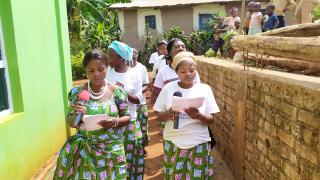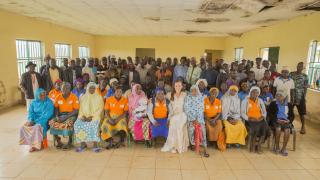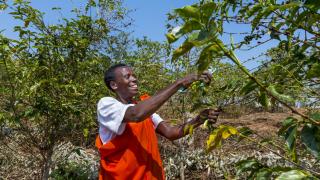'My love, whom I respect’: Working with men in Nigeria to combat domestic violence and promote equal relationships
Alice is a young mother from Plateau State in north-central Nigeria, an area with a long history of conflict between ethnic groups competing for land. Thousands have been killed and forced from their homes in the last year alone, and tensions are never far from the surface.
Yet for Alice – as for many women living in deeply patriarchal rural communities in Nigeria – the biggest threat of violence lies even closer to home.
An epidemic of domestic violence
According to a national survey, 25 percent of ever-married women age 15-49 reported having experienced emotional, physical, or sexual violence from their spouse, and 19 percent reported having experienced one or more of these forms of violence in the past 12 months.
This epidemic of domestic violence is rooted in traditional gender norms, which instill a severe power imbalance within marriages. Women are typically viewed as the property of their husbands, and abusive, controlling behaviour is widely accepted as natural and normal - including by women themselves. According to UN data, over 35% of Nigerian women and girls aged 15-24 believe a husband is justified in beating his wife under at least one condition.
In addition to the devastating impact on women's physical and emotional wellbeing, intimate partner violence exacts a crippling social and economic cost to families and communities - for example, by preventing women from earning an income and investing in their children's health and education.
Engaging men to shift social attitudes
Alice's Story
“I have been married to my husband Amos Ishaya for six years and we have two children, my son is one year old and my daughter is three, she is in her first year of primary school.
The first two years of our marriage were very happy; we worked together on our farm and spent quality time at home. But after the birth of our second child, his attitude began to change.
I worked alone on the farm during the harvest, and I would walk 120km to the market in Jos to sell the produce. When I returned, he would forcefully take the money I had made, leaving me and the children to go hungry.
Then to my surprise, one morning a few months ago he followed me to the farm to help, and when we returned home at the end of the day, he joined me in doing the housework rather than going out drinking. This positive attitude continued. He started paying more attention to the children. As we were doing chores one day, he called me ‘Akang’, short for Akang’adish -- a word of endearment in our culture which means ‘my love whom I respect’. It gave me a nostalgic feeling which instantly sent chills down my spine.
Initially I didn’t understand this sudden change in behaviour, until I came across his name tag from the Women for Women International Men’s Engagement Programme.
He explained to me what he had been discussing during the sessions and the impact it had made on him – especially the topics on the division of labour and violence against women.
He committed to abstaining from alcohol, so that our family could have a better life and save more money. This positive, loving attitude from my husband has been ongoing for the past two months. I really appreciate Women for Women International for introducing the Men’s Engagement Programme to our community, as it has saved my family.”
Asked for his perspective, Alice’s husband Amos said:
"I now have a good understanding of women’s rights. I love, respect and treat my wife with dignity that she deserves.
I am now a better person. Since I stopped drinking, I am not aggressive like I was before. I have encouraged my younger brothers and friends to also shun violence against women and to see women as their equal, rather treating them like property."
Measuring impact
Alice and Amos’ story is borne out by survey data from our 2019 MEP graduates and community focus groups, which demonstrate the positive impact of the training:
-
From a sample of men who completed men’s engagement in Nigeria in 2019, we see big improvement in men’s reported attitudes towards gender equity and women’s rights. One measure – the gender equitable men (GEM) scale – sees big increases in men’s attitudes towards gender equity from before enrollment (baseline) to 6 months post-training (endline); 91% of men reported an increased GEM scale score, and the share of men whose attitudes fit the category of “high equity” increased from just 8% to 61%.
-
Men in this sample also report an increase in involving their spouses in household decision-making; by endline, 87% of men report involving their wives in household financial decisions, compared to 53% at baseline.
-
Men also report improved household behaviour with respect to their relationships with their spouses. By endline, 82% of men report having recently worked together with their spouse on a project, compared to just 43% of men before participating in the programme.
-
By endline, 80% of men agree that stereotypes about masculinity and the role of men in society can be harmful to women, compared to 36% of men at baseline.
-
Generally, participants attested that there has been a remarkable change in the attitude of their spouses and male relatives since they attended the Men’s Engagement Programme training. As a result, men participate more in household tasks and they share in the responsibilities. ‘’My husband fetches firewood, when I am cooking. He takes care of the crying baby,’’ said a participant in Shere community.
-
Several participants cited reduction in domestic violence, husbands taking important decisions with their wives, and husband spending quality time with children at home as ways which the men’s training has impacted the family and the relationship positively.
-
Some participants recalled incidents in the community where men took action to support women’s rights, such as advocating for girls' education and against forced marriage. One participant in Pankshin community reported: “My husband spoke to a man in the community who does not pay school fees for his children simply because they are girls, he sensitised him about the importance of educating girls and now the man has enrolled all the girls in school.’’
In the Democratic Republic of Congo, graduates of our programme are organising 'Community Forums' to educate and engage local leaders on women's rights issues, and find solutions to the major barriers women face.
Brita Fernandez Schmidt, Women for Women International UK's Executive Director, shares her 3 top tips to include women in peacebuilding processes that she learned during her latest trip in Nigeria.
For World Entrepreneurs’ Day, we’re celebrating some recent success stories from businesswomen in Rwanda, DRC and Nigeria.



